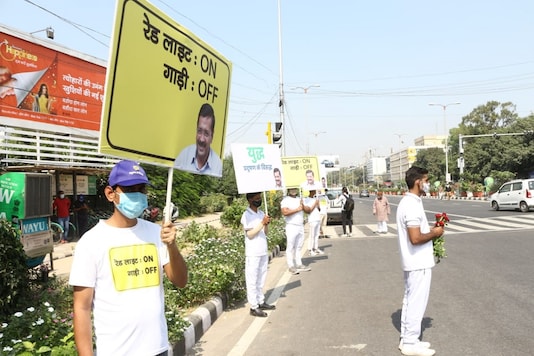Red Light On, Gaadi Off: AAP Govt's Drive Against Vehicular Pollution off to 'Rosy' Start

Environment marshals of 'Red light On, Gaadi Off' campaign can been seen on roads in Delhi. (Image: Delhi CM Arvind Kejriwal Twitter handle)
Dressed in white t-shirts, with placards and red roses in their hands, volunteers reached out to motorists in the capital, urging them to switch off their vehicles as they waited for the red traffic lights to turn green.
- CNN-News18 New Delhi
- Last Updated: October 21, 2020, 19:10 IST
- FOLLOW US ON:
A handful of volunteers, called environment marshals, fanned out at ITO, one of the hundred busiest traffic crossings in the capital, where the "red light on, gaadi off" campaign is focused. Dressed in white t-shirts, with placards and red roses in their hands, they reached out to motorists , urging them to switch off their vehicles as they waited for the red traffic lights to turn green. The drivers right at the front of the rows and columns of vehicles promptly turned off their vehicles when approached, some on their own. However, compliance was not as robust towards the tail end.
Satyendar, in his mid twenties, was driving with his entire family in a Maruti van and had switched off the ignition. He was already aware of the campaign and said he would continue with the practice whenever forced to wait at red lights. "I will switch off the vehicle at all traffic signals to fight against pollution, Save fuel...this practice will benefit everyone," he said with conviction.
Autorickshaw driver Ramesh, who had a red rose offered to him by an environment marshal, strapped to the handle of his three-wheeler, said, "Earlier also, I always used to switch off my vehicle while waiting at 'badi red light', where I had to wait for a minute or more, and will continue to do that. However, it will be difficult to switch off the vehicle at shorter signals, where the wait is just 20 to 30 seconds." Ramesh welcomed the new initiative of the government, "Pradushan se bachenge, kaafi asar padega (We'll be safer from pollution, this will have significant impact)." Four-wheelers, which had the air-conditioners on inside, were most hesitant in turning the ignition off.
Environment marshal Lalit was out on the roads with six red roses in his hands. "I will give a rose in gratitude to those who comply. I will also give a rose to those who do not turn off their ignition with the request that they also comply," said Lalit. While Lalit has worked on campaigns earlier, for Gaurav, who has a BA degree and is getting trained as a civil defence volunteer, it was the first time. "I want a pollution-free Delhi and therefore I am standing here. I like the work. Who does not like working towards cleaning one's own country," he said.
Delhi environment minister Gopal Rai said, "Until now, in this war against pollution, the government of Delhi and various agencies were involved. From today, we call upon the two crore people of Delhi to participate." Rai termed the campaign as "a mega effort to reduce vehicular pollution, that aims to stop the fuel burning that happens at traffic signals".
The "red light on, gaadi off" campaign will run from October 21 till November 15. On the campaign sustaining itself beyond the 15th, the environment minister pinned his hopes on changed habits of people. "We hope that by the 15th of November, the habits of people would have changed. Now, you see, wearing of masks has become a habit. The whole of Delhi, the whole of the country is doing it . Basically, this campaign is a campaign to change the mindset and I trust that by the 15th, we would be successful in changing the habits of the people," Rai said.
The minister added that the government will think about implementing the odd-even car rationing scheme in an "emergency situation". "Due to the lockdown, all activities had come to a standstill. In that context, we are using all the methods available to us through which the levels of pollution can be decreased. That is why we are tackling all sources of pollution: whether it is dust or biomass burning or vehicular, so that we can fight against pollution as well as activities in Delhi can continue. However, in spite of that, if there is an emergency, the government will think about it (odd-even)."
On measuring the reduction in vehicular pollution due to this campaign, Rai quoted studies already available and said, "While experts will measure the impact of this step, but studies available already indicate that on an average, in Delhi, one running vehicle ,it waits at red lights for 15 to 20 minutes per day burning fuel. If our behaviour changes, there will be a reduction of 15 to 20% in vehicular pollution."










